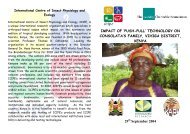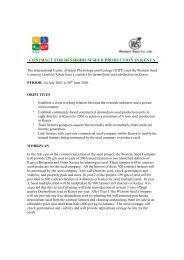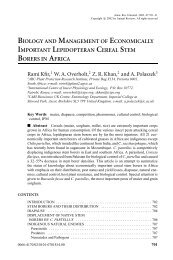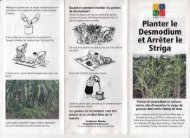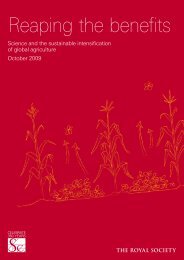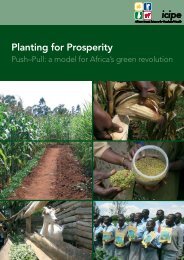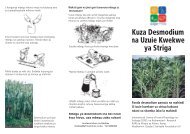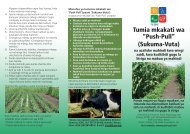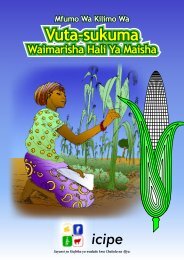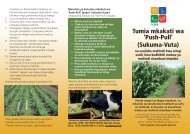Lebesa, L.N., Khan, Z.R., Kruger, K., Bruce, T.J.A ... - Push-Pull
Lebesa, L.N., Khan, Z.R., Kruger, K., Bruce, T.J.A ... - Push-Pull
Lebesa, L.N., Khan, Z.R., Kruger, K., Bruce, T.J.A ... - Push-Pull
You also want an ePaper? Increase the reach of your titles
YUMPU automatically turns print PDFs into web optimized ePapers that Google loves.
International Journal of Pest Management<br />
Vol. 58, No. 2, April–June 2012, 165–174<br />
Farmers’ knowledge and perceptions of blister beetles, Hycleus spp. (Coleoptera: Meloidae), as pest<br />
herbivores of Desmodium legumes in western Kenya<br />
Lefulesele N. <strong>Lebesa</strong> a,b,c *, Zeyaur R. <strong>Khan</strong> a , Kerstin Kru¨ger b , Toby J.A. <strong>Bruce</strong> d , Ahmed Hassanali e and<br />
John A. Pickett d<br />
a International Centre of Insect Physiology and Ecology, P.O. Box 30772, Nairobi 00100, Kenya; b Department of Zoology and<br />
Entomology, University of Pretoria, Private Bag X20, Pretoria, 0028, South Africa; c Department of Agricultural Research, Box 829,<br />
Maseru, 100, Lesotho; d Biological Chemistry Department, Rothamsted Research, Harpenden, Hertfordshire AL5 2JQ, UK;<br />
e Chemistry Department, Kenyatta University, P.O. Box 43844-00100, Nairobi, Kenya<br />
(Received 11 January 2011; final version received 18 October 2011)<br />
Downloaded by [ZR <strong>Khan</strong>] at 01:18 31 May 2012<br />
A survey was undertaken to determine the pest status of herbivorous blister beetles, Hycleus spp., in western Kenya<br />
where they attack crops such as Desmodium spp., other leguminous plants and sweetpotato. Desmodium spp. are<br />
important intercrops in the ‘push–pull’’ strategy adopted for Striga and stemborer control in maize and sorghum.<br />
Production of desmodium seed is adversely affected by blister beetles, which feed on the flowers and negatively affect<br />
seed setting. To assess farmers’ knowledge and perceptions of Hycleus spp. as pests, a questionnaire survey was<br />
conducted in three sites in Bungoma district, western Kenya, in 2007. The survey was followed by field sampling of<br />
Desmodium spp. and sweetpotato to compare the results with the responses received from farmers. Hycleus spp. were<br />
mentioned by 75% of the respondents as major pests of Desmodium spp. During field sampling Hycleus spp.<br />
comprised 70% of the insect pests collected. According to farmers, blister beetles were more abundant on<br />
desmodium than on sweetpotato. However, field sampling revealed that differences in beetle abundance on the two<br />
crops were not consistent across different sites, suggesting that these crops may function as alternative hosts. The<br />
study provides baseline information for the development of a management strategy for blister beetles.<br />
Keywords: Desmodium spp.; questionnaire; field survey; pest status; sweetpotato<br />
1. Introduction<br />
Desmodium spp. (Fabaceae), such as Desmodium<br />
uncinatum Jacq. DC., play an important role as<br />
intercrops for maize and sorghum in ‘‘push–pull’’<br />
crop protection strategies due to their repellent<br />
(‘‘push’’) properties against maize stemborers (Lepidoptera),<br />
and their ability to cause suicidal germination<br />
of dormant seeds of witchweed, Striga spp.<br />
(Scrophulariaceae), and so suppress population levels<br />
of that parasitic weed (<strong>Khan</strong> et al. 2000, 2002, 2006a,<br />
2006b, 2008a). The ‘‘push–pull’’ strategy was developed<br />
for small-scale farmers by ICIPE (International<br />
Centre of Insect Physiology and Ecology) and its two<br />
partners, KARI (Kenya Agricultural Research Institute,<br />
Kenya) and Rothamsted Research, UK (Pickett<br />
1998; Cook et al. 2007; <strong>Khan</strong> et al. 2008a). Apart from<br />
its role as an intercrop in the ‘‘push–pull’’ technology,<br />
Desmodium spp. (hereafter referred to as desmodium)<br />
are also nutritious fodder crops for livestock (PANE-<br />
SA/ARNAB 1990; Paterson et al. 1998; <strong>Khan</strong> et al.<br />
2006a). Thus, desmodium is valuable for small-scale<br />
farmers. The increased demand for desmodium seed<br />
associated with the widespread adoption of the ‘‘push–<br />
pull’’ technology prompted ICIPE and its partners to<br />
establish community-based desmodium seed production<br />
units in East Africa (<strong>Khan</strong> et al. 2008b).<br />
The main constraint upon the production of<br />
desmodium seed is infestation by blister beetles,<br />
notably Hycleus spp. (Coleoptera: Meloidae; formerly<br />
Coryna) (Pickett et al. 2010; <strong>Lebesa</strong> et al. 2011), which<br />
feed on flowers causing damage and preventing the<br />
development of seed. Apart from desmodium, blister<br />
beetles have been observed feeding on floral parts of<br />
other crops such as sweetpotato, cowpea and okra in<br />
several parts of western Kenya (L.N. <strong>Lebesa</strong>, unpublished<br />
observations). The available literature on<br />
meloids in Kenya, however, mainly documents Coryna<br />
and Mylabris as being associated with other leguminous<br />
crops (Abate and Ampofo 1996; Hillocks et al.<br />
2000). Mylabris spp. and Coryna spp. are reported to<br />
co-occur frequently on the same plant crop in various<br />
sub-Saharan countries (Abate and Ampofo 1996;<br />
Tanzubil and Yakubu 1997; Lale and Sastawa 2000).<br />
In West Africa, several species of blister beetle, for<br />
example Psalydolytta spp., Mylabris spp. and Hycleus<br />
spp. (formerly Coryna) (Bologna and Pinto 2002), have<br />
been observed feeding on pollen or flowers of various<br />
grain crops such as sorghum, pearl millet and cowpea,<br />
*Corresponding author. Email: lefulesele@yahoo.com<br />
ISSN 0967-0874 print/ISSN 1366-5863 online<br />
Ó 2012 Taylor & Francis<br />
http://dx.doi.org/10.1080/09670874.2012.673032<br />
http://www.tandfonline.com





